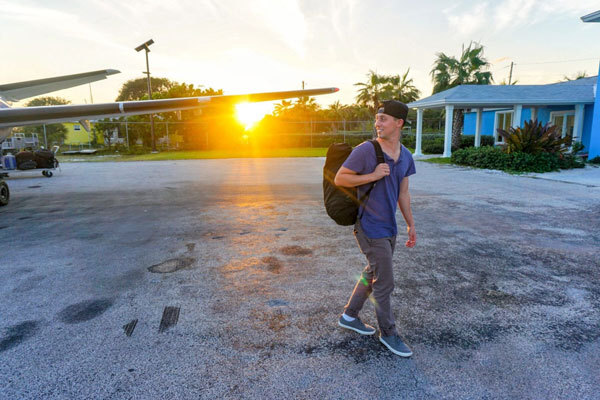As a result of the COVID-19 epidemic, the world as we know it has undergone a significant transformation. This is most obvious in the people who work in the tourist sector.
Countries whose economies rely on tourists are losing more and more money as fewer people take vacations. As a result, workers are now permitted to perform their duties away from the office, a trend expected to continue.
Countries that provide what is described as the traditional nomadic visa are meeting the interests of both tourist locations hoping to attract visitors while lowering the danger of breakouts and professionals who want a vacation from their home workstations.
Digital Nomad Visa: What Is It?

The term "digital nomad" refers to a migratory individual who works remotely from a different country using only their electronic gadgets and the internet. The phrase "digital nomad visa" is used to describe a document or app that enables its user to work and reside in countries other than their own without worrying about their immigration or employment status.
Authorities that grant digital nomad visas don't always refer to them via that designation. Instead, they may employ a more generic word like "permanent residence" or another more specific one like "member of the human race concierge scheme," as in the Virgin Islands. However, be aware that such passports may well not cater specifically to digital nomads.
A digital nomad visa may be obtained in some nations by employing an employment application. Companies employing four or more employees in Dominica will pay $800 USD for the program, plus $500 for each additional employee.
Advantages and Disadvantages of Digital Nomads
If you're thinking about finding a job in another country, you must check the local regulations and adhere to them. Operating with a digital nomad visa has its advantages, but it also has its drawbacks.
Advantages
The most obvious benefit of enrolling in such a course is the ability to take a lengthy trip without compromising your regular income or putting your professional life on hold.
Some areas are relatively secure from the COVID-19 outbreak because of their isolation and the swift actions of their governments. Visitors to such locations may encounter stringent rules and regulations.
Disadvantages
A digital nomad has to have a job that allows them to work remotely and has some degree of flexibility. When there is a transition time, it is critical to keep this in mind when recording the hours worked. Even though occupations of this nature have become increasingly prevalent amid the epidemic, this may be an absolute agreement for specific businesses and individuals.
Considering the expansion of the Delta virus, regular international travel might be unpleasant, especially if you have to do so because of work or family obligations. It might be pricey as well. That doesn't include the expense of obtaining the visa. If your access to your following intended location is denied, you may have just a short time to get other housing before being expelled.
Relocating may make it tough to establish new friends and keep in touch with those you already have, and it can put pressure on your social connections due to the continual separation. There's hardly much use in putting down everlasting roots somewhere you won't be residing within a year or two, except if the nation in question allows you a permanent position after your work permit expires.
Countries Offering Digital Nomad Visas

Following are some nations here that are offering digital Nomad Visas:
Anguilla
By participating in the Beyond Extraordinary Anguilla program, digital nomads have the opportunity to spend up to a year living in the British Overseas Territory of Anguilla. You will be required to pay a travel cost of $2,000 per individual or $3,000 for a family of up to four individuals if you choose to engage in remote work while staying on the island.
Antigua & Barbuda
On both islands, residents who make their living from home can participate in extended-stay initiatives such as the Nomad Digital Residence. It costs US$1,500 per person and is valid for two years. The cost is $2,000 for a couple and $3,000 for a family of three or more.
Bahamas
By taking advantage of the Bahamas Extended Access Travel Stay program, digital nomads have the ability to work from any of the 16 islands in the country for a whole year. Applying requires a USD $25 charge, the applicant's passport data page, proof of employment, and a health insurance card. In most cases, the application can be processed in as little as five days.
Barbados
The Barbados Welcome Stamp was used to create a visa that enables individuals to work from the comfort of their own homes for up to one year. Application costs are $2,000 for an individual or $3,000 for a family of four. Along with the application, you are required to provide a photo that is passport-sized, the bio-data page from a current passport, and evidence of the applicant's relationship to any dependents they list on the form (if applicable).
Bermuda
Work from Bermuda Digital nomads can work from home for a year if they have this certificate. Proof of work and health insurance must be submitted together with the application fee of $263 in order to be considered. Applicants can't have a history of crimes. Even though there is no set minimum, applicants must have enough money to live on for the whole year.
Curacao
This Dutch Caribbean island offers the @HOME in Curaçao program. Available to remote workers for six months, residency can be extended for six months. In addition to the $294 in fees, the application needs a copy of a passport photo, proof of being financially stable, and proof of having health insurance. About two weeks are needed to finish the process.
All applicants must fill out their forms. Families can also apply for the program, but they must do so under the main applicant.
Croatia
Even though Croatia doesn't have visas, its program is still for digital nomads. A person and their immediate family can stay temporarily for up to one year, but they can't stay longer. You can submit a new application for six months, though.
Costa Rica
The Rentista temporary residency visa for this Central American country lets people work from home for two years. People who want to visit must make at least USD 2,500 per month. If there are more dependents, that amount could go up.
Fees must be paid, fingerprints must be taken, and a copy of the individual's birth certificate must be provided. These are just some of the additional criteria that must be met. It is possible to renew the permission if the conditions are still being satisfied.



